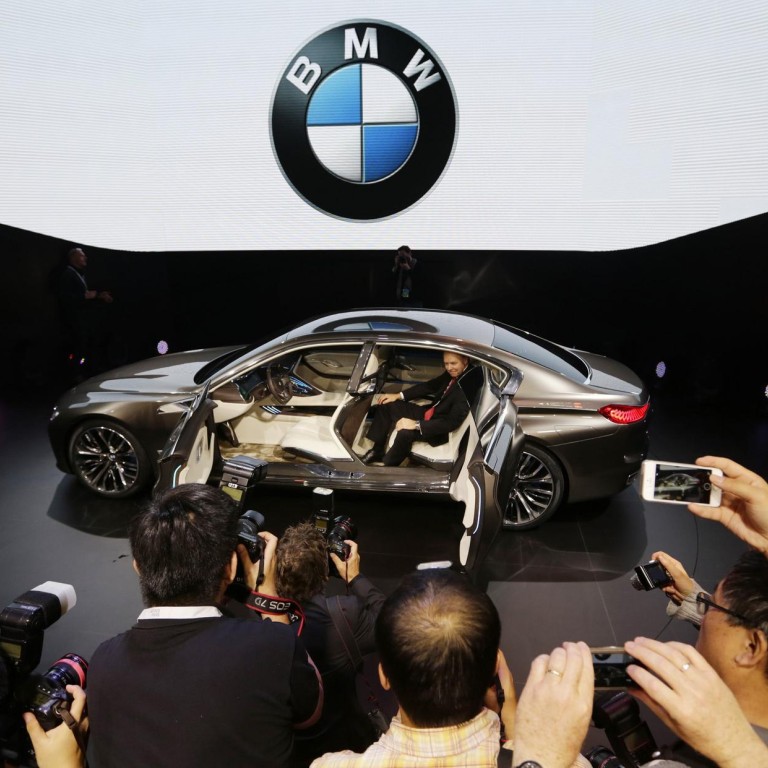
Beijing drives home status in luxury market at car show
Luxury brands vie for attention at car show that underscores the importance of China market
Premium carmakers flocked to Beijing in the past week to test the waters with their new models and concept cars, capitalising on growing demand from wealthy customers in the world's largest car market.
Among those showcasing new cars at the Beijing car show, which ends tomorrow, are global giants including German premium brands BMW, Mercedes-Benz and Audi, French brand PSA Peugeot Citroen and its Chinese partner Changan Automobile, Japanese luxury brands Lexus and Infiniti, and US car giant Ford's Lincoln brand.
BMW unveiled its "Vision Future Luxury" concept car to gauge the opinion of Chinese customers. Ian Robertson, BMW's board member responsible for sales and marketing, said in Beijing there were a number of new technology elements in the car and the company would take into account the views of Chinese customers. Luxury carmaker interest in the Chinese market has stirred up competition.
"We are producing new products; we bring new technology to the market place," Robertson said of the challenges. "We tend to look forward and shape our own future."
Other than the concept car, BMW displayed its i3 all-electric car at the show and will also introduce its i8 model to the Chinese market within months.
Jennifer Li, director of global consultancy AlixPartners, said China had become an important market for luxury carmakers over the past few years, in that they often introduced new models or concepts on the mainland first.
"The sales of premium cars in China outperformed other markets, while the strong growth is expected to be sustainable," she said.
China's car sales last year rose 13.9 per cent to 21.98 million units, according to the China Association of Automobile Manufacturers. Premium brands' sales growth outperformed the market average. Audi's sales in China grew 21.2 per cent last year, BMW increased 19.7 per cent and Volvo posted a 45.6 per cent growth.
Li said that the strong growth figures and promising outlook would continue to encourage global premium carmakers to produce customised cars to suit Chinese customers, adding that localised production would be their strategy.
Unveiling the Q50 Eau Rouge prototype car at the Beijing car show in its Asia debut, Infiniti, the luxury brand under Japan's Nissan, is targeting young-minded premium customers in China, said its president Johan de Nysschen. "China is now a top priority for Infiniti," he said.
Infiniti's China sales in the first quarter grew by 150 per cent, and Nysschen said he expected sales to continue to accelerate after the launch of the Q50 car, while the QX50 sport utility vehicle would also be launched later this year. Local production of the Q50 would be started by the end of this year, he said.
Daniel Kirchert, managing director of Infiniti China, said the carmaker planned to bring six models to the Chinese market after the Q50, three of which were customised for Chinese customers.
Arnaud Ribault, general manager of the DS brand of Changan PSA, the joint venture of Peugeot and Changan, said the Chinese premium market was its priority.
The premium market in China was about 10 per cent of the total market, while it represented 15 to 20 per cent in developed countries, said Ribault, who sees good potential for growth.
"We think that the total market for China will grow by 10 per cent this year and the premium market will grow more than 15 per cent as the Chinese car market becomes more and more mature," he said.
The Beijing car show was selected as the platform for the world debut of Changan PSA's DS6WR SUV, which was being marketed to the new generation of Chinese consumers, Ribault said.
"The SUV market in China is growing very fast, and the premium SUV market is our target," he said, adding that the DS6WR would be launched in China by the end of this year.
